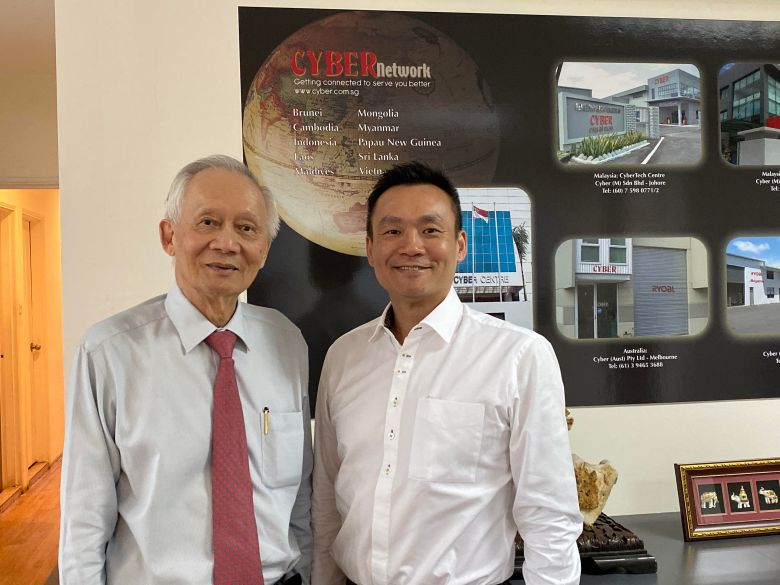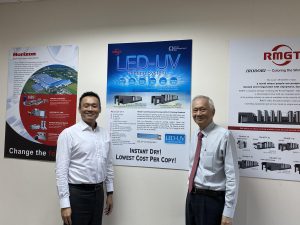
In a period of consolidation and printers marking the end of their roads, Cyber has managed to not only keep afloat but also thrive and grow beyond what it was once.
The company, that was started in 1976, has seen growth in leaps and bounds – from being just a start-up in Singapore to now becoming one of the largest printing distributors in the Asia-Pacific region.
Cyber chairman Herbert Cheong, one of the pillars of the company, saw the company through its establishment in Singapore, followed by an expansion into other countries including Australia and New Zealand, Vietnam, Malaysia, Indonesia, Thailand, outer Mongolia, Sri Lanka, Maldives, Cambodia, Myanmar and Laos.
He said the company is still committed to keep in tune with the needs of the printing industry, and in working together towards a common goal of keeping print alive through times of change.
“We’re facing what some call the sunset industries where printers are ending their operations. But the problem is, these printers have got all the wrong machines. So, the tools for printing is very important in staying relevant in the industry,” he said.
“Many presses that printers use are past their use-by dates and they’re hesitant to refresh their inventory with new machines that has features of what the market demands.”
Mr Herbert said only when printers understand the benefits of having newer machines can they experience efficiencies in their business.
“For example, we approached one of our printers to get a new machine. He initially refused, but after much convincing bought a press from us. Now, that one machine is doing the work of four of his other machines and he has since bought another five of our other newer models,” he said.
“So, we don’t need to be facing a sunset industry if printers keep themselves updated with the latest in printing technology.”
Cyber Australia managing director Bernard Cheong, who oversees the business on the Pacific side of the Tasman, said it’s not a matter of the age of the kit, but how the kit is equipped.
“You can buy today a press that is already dated. But it is too slow and cumbersome to operate in today’s economy,” Bernard mentioned.
“Today’s machines need to enable immediate delivery with LED quick drying capabilities, have perfecting functionalities, have the capacity for four or eight colours depending on the job, and be automated.”
Passion is key
According to Mr Herbert, passion for printing is the underlying requirement to remain relevant in the industry.
“We have been in this business for more than 40 years. In the beginning, we made plenty of profit – we used to sell one machine a day. In the first eight years of the business, we sold 1000 presses. But now that growth, as all businesses go through, has plateaued and it’s the passion that drives us,” he said.

Bernard mentioned that the need to constantly evolve is also another reason that Cyber has remained relevant.
“We never sit still. We now represent Ryobi in 13 major countries, mostly within Asia-Pacific and have worked with the business for more than 40 years. We get involved in product development, etc. and are much in tune with each other. We want to continue building on that partnership,” he said.
“We also work very closely with our users to make sure we do what we can to improve productivity and efficiency. Workflow and processes have to be right as there is no room for mistakes.
“All businesses should also watch their bottom lines. What equipment you use is actually secondary; you should look at the bottom line of your business and pick the right machine to improve your bottom line.
“That’s why business owners are easier to have conversations with than business managers as they’re more interested in bottom lines and make the necessary decisions to evolve. If you don’t make your bottom lines, you lose your passion.”
Moving forward, Mr Herbert said the company will keep working on its strengths and adding value to the industry. He added that the packaging space is flourishing and Cyber is aiming to make its mark in it.
“We cannot deny that commercial printing is plateauing and that the packaging area is growing. So, we want to increase our play in this area,” he said.
“We are not resistant to change, and neither should our industry be. We have to do what it takes to keep moving forward in the industry and evolution is a key part of that process.”
Bernard added that the function of printing itself has changed.
“In the early days, printing was considered a craft. Today, it is a commodity. But when you bring the craft back, that is when you bring the margins back. There is no margin left in commodity anymore – your commodity is the same as everyone else in the market,” he said.
“But when you bring the craft back in what you do, you’re creating something different and this will result in a closer bind between you and your clients.
“If you think there isn’t a market for craft or something different, consider it again. That is what may differentiate you in the market and position you in a space where there aren’t any competitors and result in you being a market leader.”
Branching out into other businesses
Being in print distribution isn’t the only business that the Cheong family is involved in.
Their other investments include a candy business, Hudson’s, that was in operation since 1899. The Cheong family bought over the business five years ago.
“The owner of this candy factory was diagnosed with cancer and his children were not interested in taking on the business. So, he put up the business for sale and we bought it,” Mr Herbert said.
“For us, it’s about having a business besides what we do on a daily basis. We’re not deviating or getting out of the printing business; we’re adding in and confectionery is ever-growing and is an evergreen market so it sparked our interest.”
Mr Herbert and Bernard are also bringing to market some robotic devices as well.
They recently launched a robotic cart business named Thouzer and robotic wheelchair business named Garoo, both manufactured by Doog Inc.
Both solutions function as human-assist technology, with “follow-me” functionality. Using wide-angle sensors, the solutions automatically follow the operator and can track the target within a 10m circumference.
Thouser is already in use by DHL.
“This new generation of robots are designed to work alongside people, not people-free areas. They use Lidar technology, which are laser-guided solutions,” Bernard said.
Mr Herbert said the brand Cyber is quite fitting for these robotic solutions.
“The meaning of Cyber is the study of communications and control. What we’re bringing to market is communication equipment. At the same time, the machine is being controlled,” he said.
“Robots are going to take over the mundane work that people don’t have to do. In printing, for example, there is a lot of work that is manual. What Thouzer allows is replace all of these work with robots so that people can focus their efforts on more important and less mundane work.”
Comment below to have your say on this story.
If you have a news story or tip-off, get in touch at editorial@sprinter.com.au.
Sign up to the Sprinter newsletter
